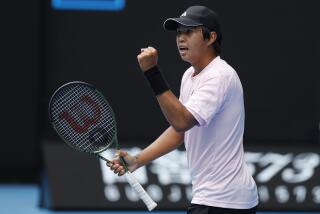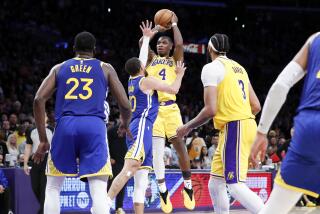He Stopped Walking Away : After Almost Six Years Off, Chapman’s Miles Walker Was Older and Wiser When He Returned to Tennis
For Miles Walker, leaving college and competitive tennis was the only way he could eventually get back.
He left in 1980 and didn’t return for nearly six years. When you’re in your early 20s, that’s a layoff of almost a third of a lifetime.
But, in Walker’s case, the situations that seemed so insurmountable at age 18 suddenly look different through the eyes of a 25-year-old.
The situations hadn’t changed. Only Walker had.
His road to Chapman College, via the College of Marin, actually started when his days at California ended.
At Marin, he won the state community college championship last season. Now he is a junior at Chapman, and his second year back in school has been one that most players can only hope for.
Walker, who is 22-5 overall and undefeated against Division II competition, is ranked second in Division II and holds the No. 56 spot among Division I players. He is one of the few Division II players with this distinction. The Panthers play a difficult schedule, and Walker has defeated some top Division I players.
Last week, Walker beat UCLA’s No. 1 singles player, Buff Farrow, 6-3, 7-6. Earlier this season, he defeated Ville Jansson of Northeast Louisiana, who was ranked No. 9 in Division I. Walker’s other accomplishments include winning the San Diego Intercollegiates singles championship in February and pushing No. 3-ranked Andrew Sznaidjer of Pepperdine to three sets before losing.
Regarding his return to college at a relatively advanced age, Walker said: “Sometimes I think it is kind of funny. I’m 25 years old and a junior in college. But I don’t mind. Everybody has to do things at their own speed.”
It was his first encounter with college and tennis that left Walker wanting to walk out. To take things at a slower pace.
First, there was the tennis. To put it simply, playing No. 6 and No. 7 singles was somewhat demeaning for a player who had been one of the top juniors in Northern California. And school? At Cal, Walker found himself with more questions than answers, and he wasn’t doing well academically.
Walker said he wasn’t satisfied with his progress on the tennis team. At 18, he found it tough to handle a secondary role.
The Bears were ranked No. 2 in the country during Walker’s freshman year. And at least three of the top six singles players went on to achieve international rankings.
When Scott McCain and two other top players graduated, Walker believed he would get a chance his sophomore season. It really never came, and he left before he finished the year.
“He felt he got lost in the shuffle,” said McCain, who is now the head coach at Cal. “It took its toll when he had a chance to step into the lineup and he didn’t come through. . . . Maybe he and Bill Wright (the former coach) didn’t see eye to eye. Miles felt Bill should have stuck with him longer.”
Said Walker: “I don’t hold any grudges or have any negative feelings. Sometimes it takes two people to make things go wrong.”
So Walker believed quitting school and tennis was the right thing to do. He worked as a waiter in his brother Tim’s restaurant, and also kept his hand in tennis, occasionally teaching some friends how to play.
“I wouldn’t say I quit altogether,” Walker said. “I played with some friends. But I quit competing. I didn’t take the tournaments as seriously as I could have.”
He paused.
“Sometimes, to learn what you want to do, you have to do some things you don’t want to do. I really wanted to go back to school. I never pictured myself playing tennis in college. I feel really fortunate, even lucky, to be doing what I’m doing.”
If Walker considers himself lucky, Chapman Coach Mike Edles most likely goes beyond that sentiment.
When Walker felt ready to return to school, he enrolled at Marin and played on the tennis team last season. George Mattias, the coach at Orange Coast College, saw Walker at the state community college tournament. Mattias told Walker about Chapman’s program, and Walker expressed an interest. So Mattias contacted Chapman about Walker.
“I really owe this guy a favor,” Edles said, laughing. “I’m indebted to George, no question about that.”
Walker’s mature presence was just what the Panthers needed. Chapman, ranked No. 1 in the country, has three freshmen in the starting lineup. The addition of Walker this spring somewhat offset the loss of junior Paul Wekesa, who has been out with a shoulder injury. Wekesa had earlier placed second in the small college nationals.
“His style is like a throwback to the old days,” Edles said of Walker. “He has a classic game. Most kids today play with a lot of topspin and two-handed shots. He’s from the old school, which I like. A very smooth player. He hits flat and he’s a great athlete. I’m glad to see you don’t need excessive topspin to do well.”
After only a few matches, Edles knew Walker could become the most successful player ever at Chapman. And being 25 has a lot to do with it.
“That’s really a big reason why he does so well,” Edles said. “He plays a mature game and he can handle stress a lot better than others. He’s like having a playing assistant coach. It’s just not good for me, it’s what the team needed.”
Said McCain: “I think now he’s much more in-tuned with winning. His focus is on winning rather than just trying to improve.”
Walker said his brother Tim had a great deal to do with the maturation process. Tim Walker provided encouragement, just enough, for him to return to school and play tennis.
They had became close while working toward a common goal, making the restaurant a success. It wasn’t easy, though, because Tim was suffering from a long illness. Although Tim died six months ago, Walker hasn’t forgotten what he learned.
From his brother’s example, Walker saw the benefits of hard work. Tim Walker constantly told him that you can’t expect to get what you want by giving only 50%.
Walker frequently relies on this advice when faced with a tough test in class or on the court.
“I don’t think I’d be here if it wasn’t for the things he did for me,” Walker said. “He was the best brother anybody could ask for. He always set a perfect example. I learned from him what is important and what is not important.”
And, with that knowledge he attained while he was away, Miles Walker was finally ready to come back.
More to Read
Get our high school sports newsletter
Prep Rally is devoted to the SoCal high school sports experience, bringing you scores, stories and a behind-the-scenes look at what makes prep sports so popular.
You may occasionally receive promotional content from the Los Angeles Times.







